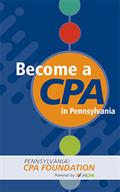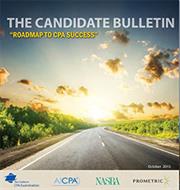Subscribe for Weekly Updates

Where Should You Apply to Take the CPA Exam?
By Meg Killian, Vice President – Member Relations
Pennsylvania colleges and universities attract many out-of-state students, so we at the PICPA often get questions about where they should apply to take the CPA Exam. The least complicated option is to apply to take the exam in the jurisdiction in which you plan to apply for your CPA license. But there are instances when this may not be ideal or possible.
For nonresident students who want to begin the exam process while still in school, or those temporarily residing in a different location from their permanent residence, there are some important considerations when deciding where to apply to take the CPA Exam.
First, it’s important to know that regardless of the jurisdiction in which you apply, you can sit for the CPA Exam at any Prometric location. Find a list of the testing centers here.
While it doesn’t matter where you physically take the CPA Exam, the requirements to sit for the exam can vary by state. The exam requirements in the jurisdiction in which you apply to take the exam will apply.
Here are a few things to consider:
- What are the education requirements to sit for the CPA Exam in that jurisdiction?
- In what jurisdiction are you planning to apply for your CPA license?
- What are the education and work experience requirements to get a CPA license in that jurisdiction?
 |
| Your comprehensive guide to becoming a CPA in Pennsylvania. |
Pennsylvania requires that you have at least a bachelor’s degree to sit for the exam, but there are a few states that only require the completion of 120 credits. Most, but not all, states require a bachelor’s degree and 150 credit hours to qualify for a CPA license.
The best place to find the exam requirements for all jurisdictions is at CPA Central on the NASBA website.
If you are an international student or have a degree in an unrelated field, it’s a good idea to submit your transcripts as early as possible to make sure that you have met the education requirements to sit for the exam. Many, but not all, states offer a pre-evaluation option, but there is a fee. Get more information about this on the NASBA website.
 |
| NASBA’s Candidate Bulletin contains information for all jurisdictions. |
If you want to apply for a CPA license in a different state than where you took the CPA Exam, you’ll need to contact the state board where you took the exam and request that they send verification that you passed the exam to the state in which you are applying for the license. In Pennsylvania there is a $25 fee for this service. You’ll still have to meet all the requirements in the jurisdiction in which you are applying.
Where you take the exam should not impact your long term career plans. Once you have a CPA license, substantial equivalency has made it easier to practice across jurisdictions. So if you relocate or are servicing clients in a state that are not in the same jurisdiction of your place of business, you will still have the privilege to practice without applying for a license in the other jurisdiction. There are some exceptions and not all states follow substantial equivalency, so be sure to verify on the NASBA website or at www.cpamobility.org.
For answers to additional questions, contact the PICPA at careers@picpa.org or (215) 496-9272. We’re here to help you during this exciting journey to becoming a CPA! Good luck!







Leave a commentOrder by
Newest on top Oldest on top